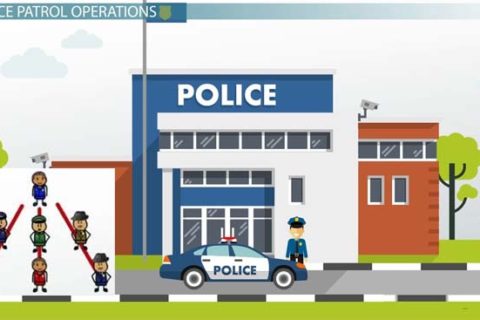In California, domestic violence is an extremely serious crime. In addition, California has several sections of the penal code regarding domestic violence – Section 273.5(a) is one of them. So, the perpetrators of violence may not be prosecuted by one, maybe more.
In some states, arresting perpetrators of domestic violence may not be conducted due to a number of factors, but is this the same in California? Or, otherwise, do police always arrest domestic abuse perpetrators in California? Okay, here’s everything you can know about what California police do after they are called for domestic violence!
What Happens When Police Receive a Domestic Violence Case in California?
When a domestic violence report is received, California’s law enforcement agencies, including the police or sheriff’s department, will respond immediately. They will act quickly to investigate a domestic violence case at the crime scene, try to find out the facts, and determine the threat level of the situation.

The following are some of the things that police usually do when handling domestic violence cases in California:
- Dispatch the Officers: After being called, police will dispatch the officers to identify the crime scene where the incident was reported.
- Assess the Safety: Once the officers arrive at the crime scene, they will then evaluate the safety of everyone, including the alleged perpetrator, victim, and potential victim, including children and parents. The police’s priority is to make sure that everyone is safe.
- Separate Parties Involved: The officers may then separate parties who get involved in the case to prevent further violence. They may also ask questions about what happened and collect information from each person separately.
- Collect Evidence: After the alleged perpetrator, victim, and other parties involved have been separated, the officers will then collect evidence, including photographs of injuries, statements from witnesses and any others involved, and other relevant physical evidence. However, the documentation is very important evidence in handling a case if the charges are submitted.
- Arrest: The officers will then carry out an arrest if they believe there is sufficient evidence to determine the possibility that domestic violence has actually occurred. Even if the victim does not file a claim, the officers will always have the discretion to make an arrest since domestic violence is considered a serious offense.
- Provide Protective Orders: When an arrest is carried out, officers will usually provide the victim with information about how to get a protective order. Well, it can help them prevent further domestic abuse from the alleged perpetrator.
- Submit the Case: The officers will then submit the domestic violence case to the prosecutor’s office for review. The prosecutors will then determine whether or not to submit formal criminal charges based on the evidence and circumstances of the case.
- Court Process: If the charges are submitted, the case will proceed through the criminal justice system. Of course, it will involve court hearings, a plea bargain negotiation, and a trial if the case can be solved through a plea agreement.
Well, those are some steps that law enforcement agencies carry out in handling domestic violence cases in California.
Last but not least, the victims of domestic abuse can also have the opportunity to benefit from victim advocacy programs and services. These programs aim to support every victim of domestic violence and include counseling, legal assistance, and resources for looking for shelters if necessary.
Do California Police Make Arrest in Domestic Violence Cases?
Since domestic violence is a serious offense in California, the police will take reports of spousal violence seriously. They will then present the reports as part of a domestic violence investigation to a California prosecutor. If the domestic violence leads to serious criminal offenses resulting in severe injury to the victim, the county jurisdiction will always indict the domestic violence case.
In some states, mandatory arrests are made only when they have good reason to believe that domestic violence has actually occurred, while mandatory arrests are made of perpetrators of domestic violence in California. Even though the victims may lie and claim that nothing happened, arrests are still mandatory to ensure that the alleged victim is safe.
There are some pieces of evidence that could be the reason why the arrests must be carried out, including:
- Visible injures
- Confession
- Property damage
- Eyewitness statements
- Alleged victim’s reports of events
For the next step in determining whether the victim really experienced domestic violence or if it was just a false accusation against the suspect, further investigation will be carried out once the alleged perpetrator is arrested and the alleged victim is secured.
What to Do When Facing False Allegations of Domestic Violence Against You?
There is no doubt that domestic violence is considered a serious offense, resulting in a person being arrested and facing misdemeanor or felony charges, depending on several factors. However, this does not mean that all cases of domestic violence actually occur; some of them are just false accusations that want to bring down one of the parties.
If you happen to encounter false allegations of domestic violence, you shouldn’t just accept them. If you do not defend yourself, there are some consequences that you will face later, such as probation, a ban on meeting with people you love, or even imprisonment.
Defending yourself and proving your innocence is not fighting in vain. In fact, many people have either proven their innocence or gotten positive results after defending themselves. In order to get away with this fight, you may need to hire an experienced attorney. It’s important to note that you also need to comply with all legal requirements of the restraining order, if any.
If you already know that someone has submitted court papers to arrest and detain you, don’t panic if you don’t commit domestic violence. Instead, you need to carefully read it and do the following:
- If you receive a DV-110 form, you may be arrested and detained temporarily. Of course, you need to follow all the instructions on the form.
- If you get the trial date listed on the DV-109 form and do not agree with the restraining order, you should attend the court date. On the trial date, the judge may decide whether to issue a restraining order against you that can be valid for up to five years.
It’s very important for you to follow all instructions, either on the DV-110 form or on the DV-109 form. These can help you identify options for responding and preparing your case. When you respond to the order, it means that you can tell the judge if you agree or disagree with the restraining order that has been filed against you. If you do this, you may not have to hire an attorney to solve your case.

A bookworm and researcher especially related to law and citizenship education. I spend time every day in front of the internet and the campus library.





